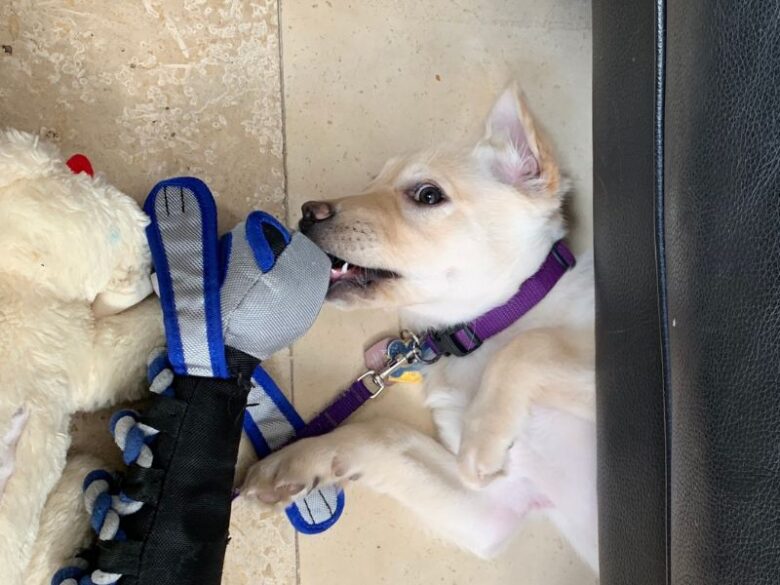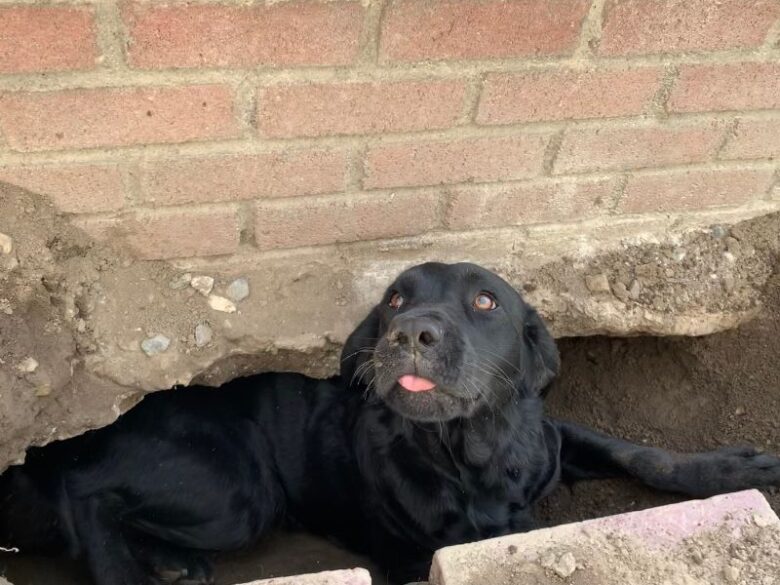27 Reasons Not To Get A Labrador Retriever
Labrador retrievers are great family dogs. There are many reasons that they’ve been the most popular breed for decades.
But they are not for everyone and there are reasons not to get a Labrador Retriever.
As a trainer, I love labs but don’t recommend them to all of my clients.

In this article, I’ll explain reasons why some people shouldn’t get a labrador retriever.
Did you know that the Labrador Retriever is now #2 on the AKC top breeds list! CRAZY!
List of Reasons Not To Get a Labrador Retriever
Labs are great dogs for people who want a family dog with a lot of energy. But some of their characteristics aren’t for everyone.
Some reasons not to get a lab include the following:
1. They Shed
A lot. Of course many dogs shed, but labs shed your-round. Regular grooming helps, but you’ll still need to vacuum and clean up dog hair.
So if you want an immaculate house, a lab is not the best choice–unless you love vacuuming, cleaning fur off furniture (after all, it’s called FUR-niture), and removing hair from clothes.
If you get a Lab you’ll get used to seeing the fur tumbleweeds rolling down your hallways.
2. Labs Aren’t Clean Dogs
Partly because they shed a lot, they aren’t the cleanest dogs. They also like to roll or wallow in smelly things outside, such as deer feces.
And their oily coat that repels water can get on walls when they rub against them. They often have a “doggy smell.”
3. They Require a Lot of Exercise
Labs are bred to work as hunting dogs. So they have energy to spare and need a lot of exercise. And if their needs aren’t met, they can become bored and destructive.
4. They Require a Lot of Attention
Labs love to be with the family. And if they’re not included in family activities, they can become bored and stressed.
This can lead to them becoming destructive and suffering from separation anxiety.
5. Labs Mature Slowly
Unlike some breeds, labs may appear to be an adult at a year old. But they are not. Physically, they may be the height they’ll be as an adult at that age.
But mentally, they’re still puppy-like and behave as a puppy. So they may still chew on and get into things like the trash and your new shoes.
They don’t fully mentally mature until they’re about two to four years old.
6. Labs are Too Popular
You might wonder: How can a dog be too popular?
Being the most popular breed for decades has some downsides. Labs are extremely overbred by backyard breeders and puppy mills.
Dogs who originate from these sources are more likely to have genetic and temperament problems than those who are well-bred.
It’s important to find a breeder who does the proper genetic testing and who properly raises the puppies. Or get one from a reputable rescue or shelter.
Also, if you want a dog who is different and stands out, a lab isn’t the best choice. In many classes that I teach, there is at least one lab or lab mix.
7. Labs Are Very Friendly
If you’re looking for a dog who just wants to be focused on your family, a lab may not be a good fit.
A properly bred and socialized labrador retriever hasn’t met a stranger.
He’s usually the greeting committee when you’re with others. And he should also get along with dogs.
So if you’re looking for a dog to protect you and your property, a lab isn’t a good choice.
8. It’s Hard To Say “No” to a Lab
Because they’re so sweet and lovable, it’s often difficult to turn down a lab who wants excessive attention.
So if your lab wants to constantly be petted or play ball–and is insistent and won’t give up by nudging or barking at you–you may give in to his excessive needs.
9. Labs Are Prone to Genetic Health Problems
Partly because they are so popular and overbred by some sources, Labs are prone to many genetic problems such as:
- hip and elbow dysplasia
- heart disorders
- hereditary myopathy (muscle weakness)
- osteochondritis dissecans (OCD)
- eye conditions including progressive retinal atrophy
- exercised-induced collapse
- bloat
10. Labs Are Genetically Predisposed to Obesity
Labs love to eat. And they are genetically predisposed to gain weight if they’re overfed and/or under-exercised.
11. Labs Aren’t Great Lap Dogs
Although your lab probably wants to be close to you and even climb onto your lap while you’re on the couch watching TV, he’s too big.
12. They Like To Chew
As a retriever who slowly matures, a lab likes to carry things in his mouth. He won’t discriminate between your new shoes and his tug toy. And he likes chewing on these items.
13. Labs Have a Tendency To Jump
Being as friendly and slow-maturing as they are, labs want to greet people face-to-face. And they jump on people in their exuberant greetings.
14. A Lab May Be Difficult To Contain
Because of their tendency to chase small animals like rabbits and squirrels, a lab may be difficult to contain.
Colby’s dog Elsa is always looking for opossums on the wall or squirrels in the tree. Once she spots one there’s now stopping her.
15. Labs Are Needy
Unlike more independent breeds, labs need to be with people. So they will want to be with you wherever you are and may get in the way.
They require a lot of attention and will often be under foot. A lab may lay in the middle of the kitchen floor while you’re trying to cook. Just make sure not to trip over him.
16. They Are Prone to Separation Anxiety
Labs need to be with people to blossom into their best selves. If left alone too often or for too long, they are prone to developing separation anxiety.
17. Labs Are Large Dogs
Of course you know this if you’re thinking about getting a lab. But consider that they’ll require a lot of room in your house, yard, and car before committing to a lab.
Here are the standard height and weight for Labrador Retrievers according to the AKC.
| HEIGHT | WEIGHT | |
|---|---|---|
| MALE | 22.5-24.5 inches | 65-80 pounds |
| FEMALE | 21.5-23.5 inches | 55-70 pounds |
18. A Lab Is Difficult To Travel With
When you have a lab, you need to consider how he will travel with you. A small car won’t do.
If he travels regularly, in order to be safe he should travel in a crate or seat belt harness–or, at the least, behind a barrier.
PRO TIP: Guide dogs are taught from a young age to ride on the passenger side floorboards.
19. They Are Expensive To Feed
Labs are large, active dogs who eat more than smaller, less active dogs do. So they’re pretty expensive to feed.
And the amount of treats and chews that they ingest will also be more expensive.
20. A Lab’s Needs Are Expensive
They require larger, more expensive items than a smaller dog would.
A lab requires a large crate, dog bed, large, sturdy toys and chews, preventative medicines such as heartworm meds, vaccinations, and neutering.
These items are often more expensive than they are for smaller dogs.
21. A Lab Is Himself Expensive
Of course you should purchase from a conscientious breeder who performs the proper tests on the breeding stock. A dog from such a breeder will be expensive.
22. Pet Insurance Is Expensive for Labs
Because of the genetic problems that a lab is prone to have, insuring a lab is more expensive than it is for many other breeds.
23. Labs Can Be Destructive of Your Yard
In addition to large urine spots that will destroy your grass, your lab is likely to be very destructive to your yard.
He will probably love to dig, especially in your precious flower beds. So if you want a lab, don’t expect to have a pristine garden. But there are measures that you can take to dog-proof your yard.

Yep, that’s Elsa lying down in the hole she dug. Looks like she was trying to get underneath the brick wall 🙂
24. Labs Don’t Do Well If Confined Inside Too Often
They need enough exercise and, although they can be great if their mental and physical needs are met, they still require some time outside playing and taking walks.
25. Training Is a Necessity
As a dog trainer, I believe that all dogs should at a minimum have basic training.
But if a small dog like a chihuahua isn’t trained, he’s not likely to knock someone over if he jumps on them. And he can’t reach too many things to be destructive.
But if a lab isn’t trained, he can barrel through life and knock people over as if they were bowling pins.
And he can easily chew up household possessions, counter and table surf, and be a one-dog wrecking crew in your yard.
So you should enroll in a well-run obedience class, which can be expensive.
26. Socialization Is Must
Of course all dogs should be properly socialized. But if a lab isn’t, he may become out-of-control in new situations that he faces in everyday life.
This can manifest itself in boisterous behavior and even in protective, aggressive behavior of the family members that he’s bonded with.
27. Labs love the water
Yep, they are water dogs. You should beware that most labs naturally love the water. We have a swimming pool and our black Lab is in the pool several times a day in the summertime. She’s even gone in a few times in the dead of winter!
Wet dogs are stinky, messy, dirty, you name it. When a wet dog comes running into the house it can be disastrous. Beware of the wet Lab!
Reasons To Get a Lab
Now that I’ve listed the down-side of labs, let’s discuss the many reasons that labs make great family pets.
1. Labs Are Friendly Family Dogs
If you want a dog who you can take everywhere, a lab can be a good fit as long as you meet his needs.
Labs have never met a stranger and are outgoing, pleasant, peaceful dogs.
They get along with and are affectionate with adults and children and other canines.
If you want to participate in therapy work, labs are some of the best, sensitive dogs to comfort people.
2. Labs Can Be Great Service Dogs
If you need a service dog, a well-trained, socialized, well-bred lab can fit the bill.
There’s a reason that you see so many labs with service dogs vests performing needed assistance to people with disabilities.
3. Labs Are Fast Learners
They are very trainable. They also house train easily.
So if you want a buddy who wows your friends when he performs his obedience commands and tricks, a lab can be a great choice.
They love to learn and are very compliant and bonded with their owners.
4. They Have Great Temperaments
A well-bred and socialized lab should have a great temperament. He should be nonaggressive and calm when his exercise needs are met.
5. Labs Are Playful
If you’re looking for a dog who is always up for fun, a lab would be a great choice.
6. They Are Adaptable and Easy Going
Labs will adapt to you as long as their needs are met. They can live with large families or even with just a solo owner as long as they receive enough socialization, training, and mental and physical exercise.
7. Labs Make Great Exercise Buddies
If you want a hiking, jogging, or walking partner, a lab can be a great choice.
Just make sure that your vet approves that he’s old enough and physically fit to participate in those activities.
8. Labs Make Great Activity Dogs
There’s a reason that you see so many labs showing in activities such as competitive obedience or rally, among other sports.
Trained properly, labs excel at such sports and often receive top scores.
Because of their intelligence, stable temperaments, and willingness to work, they make great partners in such ventures.
They also excel at conformation, dock diving, agility, field trials, and hunting.
9. Labs Are Handsome Dogs
In addition to their above attributes, labs are good-looking dogs. Whether you choose a black, chocolate, or yellow lab, he’s likely to be admired by other people.
What To Do If You Get a Labrador Retriever
If you decide that a lab’s the dog for you, congratulations! Labs can make great dogs for the right person or family.
Get him from a conscientious breeder or a great rescue or shelter. Just be sure to meet his needs, including providing:
- Physical exercise. Retrieving, hiking, long walks, and swimming can help keep your lab fit and help prevent behavioral issues due to boredom or excess energy.
- Mental stimulation. This can be by training obedience commands and tricks and enrichment toys to help expand your pup’s mind.
- Training. Labs love training. So teach him all of the basics and beyond. You want to be able to take him places without him jumping all over everyone.
- Socialization. Well-bred labs are natural social butterflies. But you still need to properly socialize a labrador so that he reaches his potential to be a great family dog.
- Attention. In addition to activities you engage in together, your lab needs you to give him attention. Spend some down time with him. Pet him. Tell him what a great dog he is.
- Grooming and cleaning up after him. Regular grooming will help prevent your home from having balls of bur floating around. And vacuum and mop any hair and muddy footprints.
- Feeding high-quality food, treats, and chews. And make sure that you provide an appropriate caloric intake to him for his age and activity level so that he doesn’t become obese.
- Exploring insurance. If you get insurance and your dog has a health issue, it could save you a lot of money down the road.
- Last, but not least: Enjoying him! Labs are fun and make life enjoyable for the right person.
FAQs
I’m thinking of getting a lab but I don’t have a lot of time to spend with him. I work long hours and leave at 8 A.M. and don’t get home until 7:00 P.M. Would a lab be a good fit?
Probably not. If you can have a trusted friend or professional spend some time with him during the day, it might work if you get a lab who is no longer a puppy.
He would need to bond with those people. And he would need to be trained, exercised, and socialized during the day as well as after you arrive home at night.
I’m looking for a canine hiking buddy. Would a lab be a good fit?
Yes–as long as he’s old and healthy enough for such an activity. Labs excel when bonding with their people. And they require physical and mental exercise.
So, as long as you meet his other needs for socialization, mental enrichment, and training, you can be very happy with a lab.
But keep in mind the downsides such as shedding hair, a tendency to chew and be destructive inside and outside of your garden, the high expense of the lab and his necessities, and his genetic predisposition to various health maladies.
I need a service dog to help me with my disability. He needs to pick up items and retrieve them for me, open doors, and turn on and off light switches. A service dog organization recommends a lab that they have. Would this breed be a good fit?
Yes. If properly trained and socialized, labs can make great service dogs.
Final Thoughts
There are many reasons why some people shouldn’t have labs as companions.
If you’re thinking of getting a lab, you need to weigh these considerations against the many great traits that labs have.
Are you thinking of getting a lab? If so, why?
If you have one, what made you decide to get a lab? Please tell us about it in the comments section below.
Save To Pinterest

Top Picks For Our Dogs
- BEST PUPPY TOY
We Like: Calmeroos Puppy Toy w/ Heartbeat and Heat Packs – Perfect for new puppies. Helps ease anxiety in their new home. - BEST DOG CHEW
We Like: Bones & Chews Bully Sticks – All of our puppies love to bite, nip, and chew. We love using Bully Sticks to help divert these unwanted behaviors. - BEST DOG TREATS
We Like: Crazy Dog Train Me Treats – One of our favorite treats for training our service dog puppies. - BEST FRESH DOG FOOD
We Like: The Farmer’s Dog – A couple months ago we started feeding Raven fresh dog food and she loves it! Get 50% off your first order of The Farmer’s Dog.
For a list of all the supplies we get for our new service dog puppies check out our New Puppy Checklist on the PuppyInTraining.com blog.
27 Reasons Not To Get A Labrador Retriever was last modified: March 28th, 2023 by
